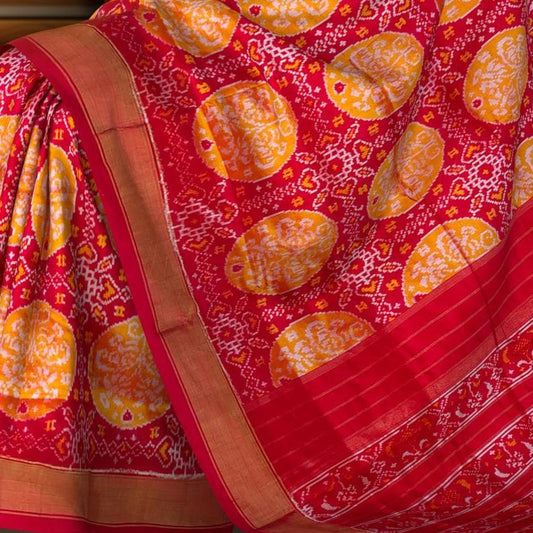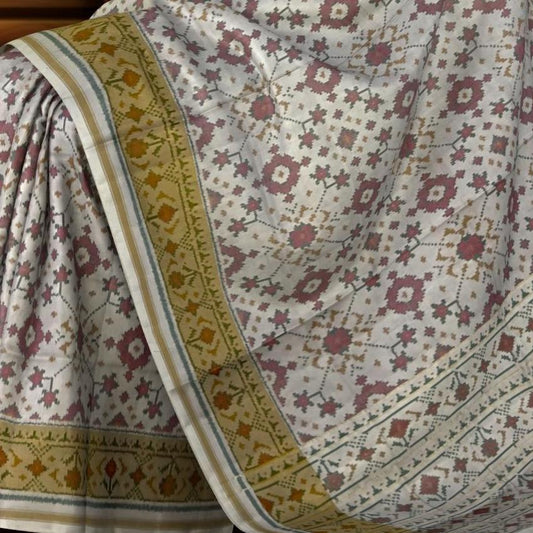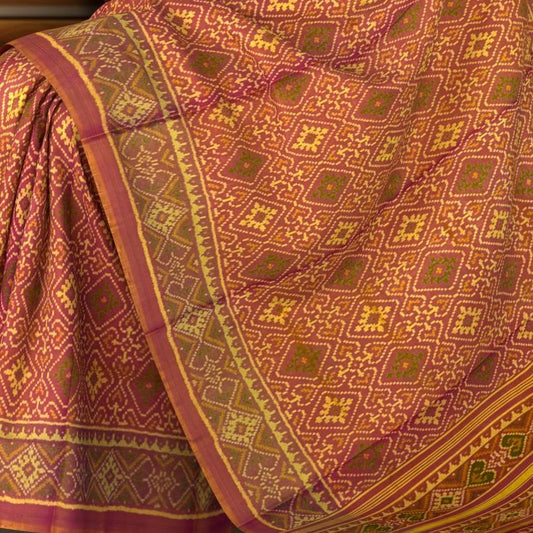Empowering Patola Weaving: Initiatives and Success Stories
Patola weaving, a centuries-old craft, is an integral part of India's rich textile heritage. Originating from Patan, Gujarat, Patola sarees are renowned for their intricate designs and vibrant colors. However, the survival of this traditional art form faces numerous challenges in the modern world. Thankfully, a concerted effort by the government, NGOs, and local communities has helped sustain and promote Patola weaving. This blog delves into these initiatives, the community's role in preserving the craft, and inspiring success stories of economic upliftment.
Government and NGO Initiatives
Government Support
The Indian government has recognized the cultural and economic significance of Patola weaving and has implemented various initiatives to support artisans. These initiatives include financial aid, training programs, and marketing assistance.
1. Financial Aid and Subsidies
The Ministry of Textiles provides financial assistance to Patola weavers through schemes like the Artisan Credit Card, which offers affordable loans. Additionally, subsidies on raw materials and tools help reduce production costs, making it easier for weavers to sustain their craft.
2. Training and Skill Development
To ensure the survival of Patola weaving, the government has established training centers that offer skill development programs. These centers not only teach traditional techniques but also introduce modern methods to improve efficiency and quality. The Handicrafts and Handlooms Export Corporation of India (HHEC) plays a pivotal role in organizing these training sessions.
3. Marketing and Promotion
The government has launched various initiatives to promote Patola sarees at national and international levels. Participation in trade fairs, exhibitions, and fashion shows helps increase visibility and demand for these exquisite sarees. The Geographical Indication (GI) tag for Patola sarees further enhances their marketability by certifying their authenticity.
NGO Contributions
Non-Governmental Organizations (NGOs) have been instrumental in supporting Patola weavers by providing resources, training, and market access. These organizations work closely with artisans to address their needs and challenges.
1. SEWA (Self Employed Women's Association)
SEWA has been a significant player in empowering Patola weavers. By forming cooperatives, SEWA helps weavers pool resources and share profits. They also provide training in modern weaving techniques and financial literacy, enabling artisans to manage their businesses effectively.
2. Dastkar
Dastkar, an NGO dedicated to promoting traditional crafts, has been actively involved in the revival of Patola weaving. Through workshops and exhibitions, Dastkar creates platforms for weavers to showcase their work and connect with potential buyers. This exposure is crucial for sustaining the craft in a competitive market.
Community Efforts to Sustain Patola Weaving
The survival of Patola weaving relies heavily on the dedication and efforts of local communities. These communities have implemented various strategies to preserve and promote this ancient craft.
Family-Based Weaving Units
Patola weaving is traditionally a family-based occupation, with skills passed down through generations. Families play a crucial role in sustaining the craft by involving younger members in the weaving process. This ensures the continuity of the craft and keeps the traditional techniques alive.
Cooperative Societies
The formation of cooperative societies has significantly contributed to the sustainability of Patola weaving. These societies enable weavers to collaborate, share resources, and collectively market their products. By working together, weavers can negotiate better prices and access larger markets.
Community Workshops and Exhibitions
Local communities organize workshops and exhibitions to raise awareness about Patola weaving. These events provide a platform for artisans to demonstrate their skills, interact with customers, and sell their products directly. Community involvement in such activities fosters a sense of pride and ownership among weavers.
Success Stories of Economic Upliftment Through Patola
The combined efforts of the government, NGOs, and local communities have led to numerous success stories of economic upliftment among Patola weavers. Here are a few inspiring examples:
Reviving a Dying Craft: The Story of the Salvi Family
The Salvi family, one of the oldest Patola weaving families in Patan, has played a crucial role in reviving the craft. Faced with dwindling demand and rising production costs, the family sought help from government schemes and NGO support. Through training and financial assistance, they modernized their techniques and expanded their market reach. Today, the Salvi family is renowned for their high-quality Patola sarees, and their success has inspired other weavers in the region.
Empowering Women Weavers: The SEWA Initiative
SEWA's efforts in organizing women weavers into cooperatives have yielded remarkable results. One such cooperative, the Patan Patola Women's Cooperative Society, has transformed the lives of many women in the region. By providing training and market access, SEWA has enabled these women to become financially independent. The cooperative's success has not only uplifted individual weavers but also strengthened the community's economic fabric.
The Dastkar Connection: Expanding Market Horizons
Dastkar's involvement in promoting Patola weaving has opened new avenues for weavers. Through participation in national and international exhibitions, Patola weavers have gained exposure to diverse markets. This has led to increased demand and higher incomes for the artisans. The story of Rajeshwari, a young weaver from Patan, exemplifies this success. With Dastkar's support, Rajeshwari showcased her sarees at an international exhibition, attracting buyers from around the world. Today, she runs a successful business, providing employment to several other weavers in her community.
Conclusion
The journey to sustain and promote Patola weaving is a testament to the power of collaboration and dedication. Government initiatives, NGO support, and community efforts have collectively breathed new life into this ancient craft. The success stories of economic upliftment among Patola weavers highlight the transformative impact of these efforts. As we celebrate these achievements, it is essential to continue supporting and promoting Patola weaving, ensuring that this cultural heritage thrives for generations to come.







Leave a comment
Please note, comments need to be approved before they are published.